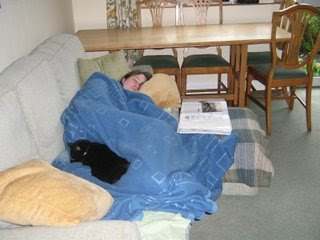
This evening I gave you the tent analogy. As you write a critical (literature) essay, you’re answering the question (obviously) and you need to remember to do so by SECTing or something along these lines. But do also keep remembering to
pin the essay down to the question. It’s a good idea to use the words of the question from time to time, to make it clear to the examiner that you’re doing so.
The tent? You might like to think of your essay as a tent that keeps trying to blow away (this is like when you waffle off the subject).

Read over what you write after each paragraph, and pin it down to the question by brief comments to
MAKE it relevant, eg “Here we see another example of
conflict… This shows
vivid creation of character…. This shows a
turning point…” – depending on what the question is, of course. Use the words of the question, or variations of them, as
tent pegs! And these “pegs” can be added afterwards if you forget to put them in at the time - as long as you can squeeze them in to the space.
(You have no idea how hard it is to find pictures of tents flying away. For some strange reason, most people don't seem to stop to take photos of this. Presumably they're busy chasing the tent.)
Remember that you may know why you wrote something, but the marker isn’t a mind reader. Be very definite about making the relevance of what you’ve written very obvious to the dimmest examiner.
You have a new literature (“critical”) essay for homework:
Consider carefully the ending of a novel you know well.
Discuss in what ways the author has prepared for the ending in the earlier part of the novel.
You could write this essay by concentrating on the structure of the novel – the two station scenes – and how the theme of trust is seen very differently in each of them. You would obviously have to deal with some of the bits in between as you did this, but you would try to pick out the bits that are relevant to both, ie you’d need to discuss the characterisation of Barnaby and Sophia and some related matters.
You might also want to bring in other themes, eg change/families/etc.
You might like to bring in some symbols, eg the Twinform and the importance of money.
You would need, I think, to deal briefly with the Renascence School, so that you could bring in the earlier mention of the sonnet (“When in disgrace”) and then the importance of the sonnet on the last page. This could also be seen as part of the structure – preparing the reader to understand his sudden realisation that he may love Martine.
Remember to SECT! Critical essays should be about 700 words.
We then went over the 2005 passage 1 Close Reading and students wrote the answers to some of these in class while I discussed people’s Personal Study choices with them. If you haven’t yet read your book, this it’s now MORE than urgent that you do so!!!
We then read pages 1-25 of "A View from the Bridge" and noticed the themes of justice and honour; also the fact that the narrator/lawyer, Alfieri, notes the connection between the way things turn out in this play and the way people behaved back in the times of the Ancient Greeks and Romans.
Most people just seemed to get to question 2 or 3 in the Close Reading, so if you were off, maybe you could do these questions for next week? and also read the bits of the play that you missed.
No parties or other important life events should be scheduled in the next few weeks.
Your spare time should be dedicated to English!
This is how
NOT to study.
CRUCIALLY - I FORGOT TO REMIND YOU THAT NEXT WEEK IS THE ESSAY ASSESSMENT (WHICH YOU ALL KNOW ANYWAY) - ARGUMENTATIVE OR REFLECTIVE OR PERSUASIVE.
THIS MEANS THAT IF YOU ALREADY HAVE THE ASSESSMENTS, YOU DON'T NEED TO COME TILL 7.30. IF YOU'RE DOING THE ASSESSMENT, YOU NEED TO BRING ALONG A MARKED DRAFT - MARKED BY ME - AND THE ASSESSMENT CONSISTS OF REDRAFTING IT - WITH THE ESSAY IN FRONT OF YOU. If you don't have a draft with you, you can't do the assessment.
If you need to contact me about this, please email.
(Now I'll find out who doesn't read the blog...).
 A short blog this week – life is getting away from me.
A short blog this week – life is getting away from me.






 Today we spent much of the time doing the essay assessment. If you missed this, or if you don’t quite pass, do be ready for the reassessment on
Today we spent much of the time doing the essay assessment. If you missed this, or if you don’t quite pass, do be ready for the reassessment on 





 This evening I gave you the tent analogy. As you write a critical (literature) essay, you’re answering the question (obviously) and you need to remember to do so by SECTing or something along these lines. But do also keep remembering to
This evening I gave you the tent analogy. As you write a critical (literature) essay, you’re answering the question (obviously) and you need to remember to do so by SECTing or something along these lines. But do also keep remembering to 

